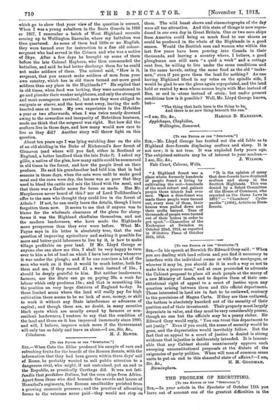[TO TEE EDITOR OF TER " SPECTATOR:]
SIR,—When Cato the Elder produced his sample of rare and refreshing fruits for the benefit of the Roman Senate, with the information that they had been grown within three days' sail of Rome, he probably wanted to call public attention to a dangerous rival, who might, if not restrained, put an end to the Republic, as practically Carthage did. It was not lati- fundia that perdidere Italians, but the corn ships from Africa. Apart from those who died beneath the swords and lances of Hannibal's regiments, the Roman smallholder perished from a growing economic pressure ; and the practice of allocating farms to the veterans never paid—they would not stop on them. The wild beast shows and einematographs of the day were all too attractive. And this state of things is now repro. duced in our own day in Great Britain. One or two corn ships from America could bring as much food to our shores as could be produced in the whole of the Highlands in a good season. Would the Scottish men and women who within the last few years have been pouring into Canada in their thousands, and leaving a country where, I believe, a good ploughman can still earn "a quid a week" and a cottage rent free, be willing to live under the same conditions and in the same hovels, eating the same food as the old " tacks- men," even if you gave them the land for nothing As one having Highland blood in my veins on the spindle side, I would be glad to see the glens again repopulated, and the /and held or rented by seen whose names begin with Mac instead of Ben, or end in -stone instead of -stein; but under present conditions how is it possible? Well, Mr. Lloyd George knows, but—.
"The thing that hath been is the thing to be,
And there is no new thing beneath the sun."
Applehayes, Clayhidon, Wellington, Somerset.






























































 Previous page
Previous page